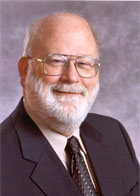
By Andrew Cohen
When Fastcase named Robert Berring ’74 “the granddaddy of legal research,” and one of the legal profession’s top 50 innovators, visionaries, and leaders, the Berkeley Law professor beamed with pride.
“I became an actual grandfather for the first time just a couple weeks ago,” he said. “Anything granddaddy-related sounds pretty great to me.”
A respected legal research service, Fastcase noted that “most lawyers learned about legal research from law school professors, and most of those professors learned from Bob Berring.” Indeed, he literally wrote the book—two of them, in fact—on legal research: Finding the Law and the Legal Research Survival Manual.
In 2006, the American Association of Law Libraries named Berring’s Finding the Law the most significant contribution to law librarianship of the past 50 years. Berring also created the award-winning and influential video series Legal Research for the 21st Century.
His interest in the subject grew during his law student days, when he noticed a “void” in legal education. Eight years after graduating from Berkeley Law, Berring returned to join the faculty and promptly designed an advanced legal research course that he would teach for nearly three decades.
“Legal research was a low priority when I was in law school and it seemed too important to minimize it,” he said. “I had a missionary zeal to change this—so much so that I informally called the course I developed Commando Legal Research. The goal was to make people understand how the over-arching system worked and what lay behind it. I used to tell students, ‘If you truly understand what a statute is and how a regulation is promulgated, it will protect you as research formats change over the years.’”
The Internet effect
Technology has driven massive changes in legal research. Today’s students conduct virtually all of their research online. But whether Berring is training new law students or seasoned attorneys—his approach never wavers.
“You still try to teach them to think about how things are assembled,” he said. “I’ve always used a practical approach that emphasizes real-world research over learning how to write a law review article.”
Although Berring recently stopped teaching legal research, he still keeps close tabs on trends in the area—both good and bad.
Like many of his colleagues, Berring first assumed that newer law students, increasingly well-versed in technology, would be more sophisticated researchers. But he has learned that a byproduct of modern advances is that “it’s now very easy to do sloppy legal research.”
Some students do not read cases in their entirety, Berring said, because online summaries are readily available. “It’s easier to find summaries of 50 somewhat relevant cases than to fully read the three most relevant cases,” he noted. “Search engines now locate all sorts of things. You even see this effect in the U.S. Supreme Court, which has begun citing newspaper and magazine articles.”
As with many pioneering ideas, Berring’s drive to transform legal research education was met with some initial skepticism. “In the old days a lot of people thought I was a nut,” he recalled. “I remember bringing Lexis and Westlaw in to conduct trainings, and needing to lure people with pizza to attend. Thankfully, it’s not like that anymore.”
A popular professor
The impact of Berring’s approach—and his natural teaching skills—are widely recognized.
In addition to his national honors, he received UC Berkeley’s Distinguished Teaching Award in 1987 and was given the school’s inaugural Legal Studies Teaching Award in May of this year. His Law in Chinese Society course, which attracts upwards of 165 students each spring, has been the Legal Studies Program’s most popular offering for years.
That popularity is “all thanks to Professor Berring,” said Lauri La Pointe, a student academic advisor in the program. “He engages his students in and outside of the classroom with humor, interesting stories, and a love of teaching. Because of his approachability and encouragement, Professor Berring also supervises individual undergrad research projects each semester and sponsors various student-run courses every year. To state the obvious, students love him.”